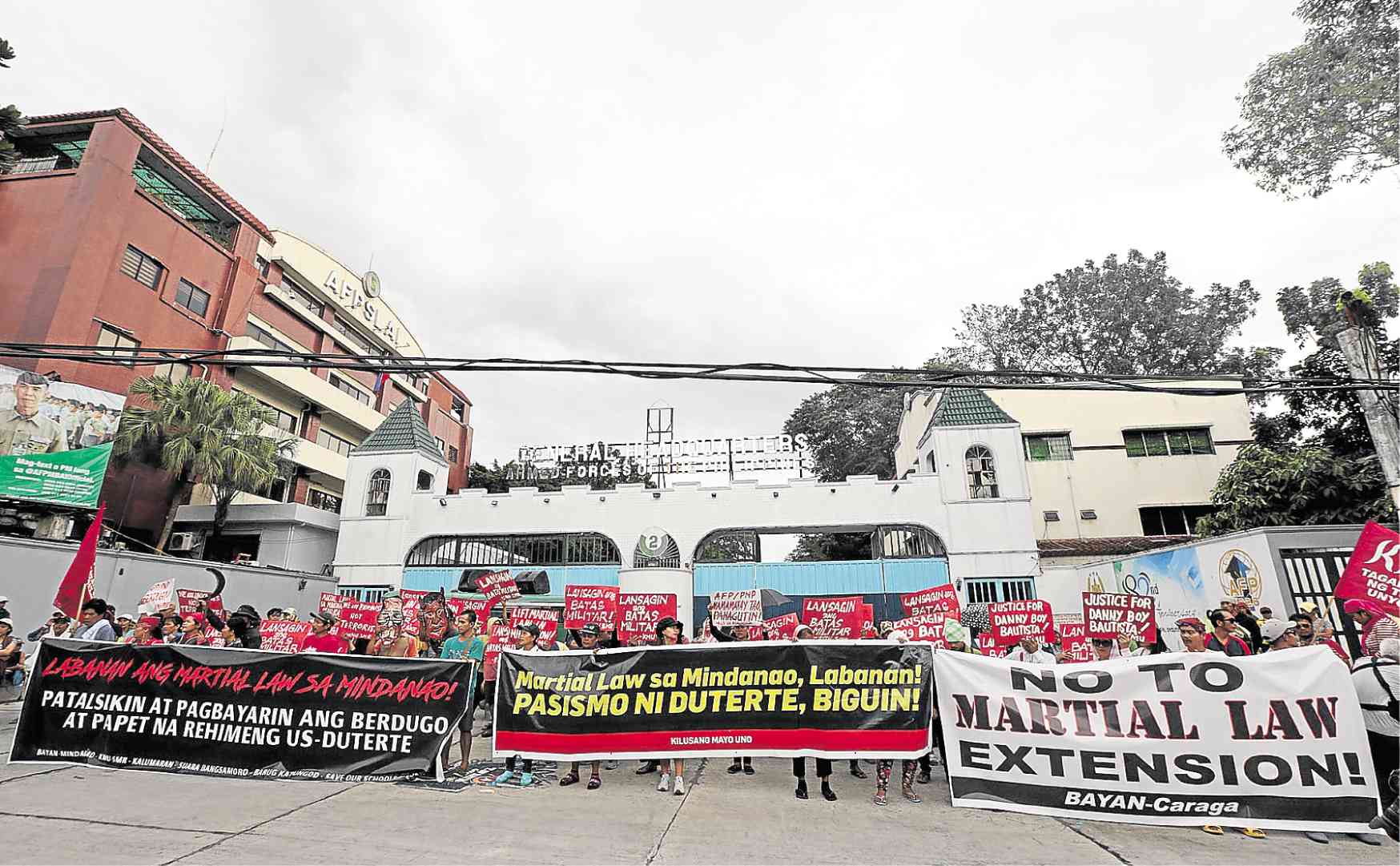Senators divided on extension of martial law in Mindanao

LIFT MARTIAL LAW The military recommendation to extend martial law in Mindanao has set off a wave of protests, including this rally by “lumad,” peasants and human rights groups in front of Camp Aguinaldo in Quezon City. —GRIG C. MONTEGRANDE
The Senate is divided on the recommendation of the military and the police to extend martial law in Mindanao for a third time.
President Rodrigo Duterte first put Mindanao under martial law for 60 days on May 23 last year after Islamic State-allied militants laid siege to Marawi City.
After the period lapsed, Congress, approving a request from the President, extended martial law in Mindanao up to the end of 2017.
But before 2017 ended, the President again sought and won an extension of military rule in Mindanao up to Dec. 31, 2018.
The President cited the continued threat of terrorism and rebellion when he made the request.
Article continues after this advertisementGen. Carlito Galvez Jr., chief of staff of the Armed Forces of the Philippines, and Director General Oscar Albayalde, chief of the Philippine National Police, have said they will recommend another yearlong extension of martial rule in Mindanao.
Article continues after this advertisement‘Terrorist lurking’
On Tuesday, Defense Secretary Delfin Lorenzana said in a television interview that he would recommend an extension, and gave assurance that martial law would not be imposed on the rest of the country.
“There are still terrorists lurking around Mindanao,” Lorenzana said.
Among these terrorists are the remnants of the Maute group, which, together with the bandit group Abu Sayyaf and with help from some foreign militants, laid siege to Marawi City in Lanao del Sur province, prompting the first imposition of martial law on the entire Mindanao.
Lorenzana said the remaining Maute terrorists were getting help from the Bangsamoro Islamic Freedom Fighters, which is fighting for a Muslim state in Mindanao.
He said the military was still verifying reports that foreign fighters returning from the Middle East had entered Mindanao and scattered across Sulu, Central Mindanao and Basilan.
“Mostly it (extension of martial law) is to ensure that we can completely eradicate the terrorist groups in Mindanao,” Lorenzana said.
Violation of Constitution
Opposition Senators Francis Pangilinan and Franklin Drilon, however, warned that extending martial law would be a violation of the Constitution.
“Martial law is an extreme measure to be imposed only in exceptional cases when there is actual rebellion or invasion and only for a very limited period. Such an extension violates the fundamental law,” Pangilinan said in a statement.
That officials want to prolong martial law in Mindanao, he said, means the imposition has failed in its stated purpose, which is to quell rebellion and terrorism on the island.
“The extension itself is a manifestation of martial law’s failure in the region. This is so because the military could never solve the people’s woes deeply rooted in poverty, lack of jobs, absence of basic services,” Pangilinan said.
If the military would insist on seeking an extension, it should show facts to back its recommendation, he said.
Drilon opposed the proposed extension, pointing out that martial law could be declared only in cases of actual rebellion when public safety required it.
It can be extended if the invasion or rebellion still exists, he said.
“There is no basis for a [third] extension of martial law, as there was no ground that necessitated the first extension,” Drilon said.
The military’s claim that “terrorism is still lurking in the area” means there is no actual rebellion, he said.
“There may be threats of rebellion, but what the Constitution clearly requires as a ground for declaring and extending martial law is the presence of actual rebellion,” Drilon added.
Sen. JV Ejercito, an administration ally, backed the recommendations of the military and the police.
Ejercito said martial law limited the movement of armed groups, as well as dealt with the problem of loose firearms in Mindanao.
“As long as there is no violation of human rights recorded, I am in favor because most Mindanaoans I talked to are happy and contented with martial law,” he added. —With a report from Jeannette I. Andrade